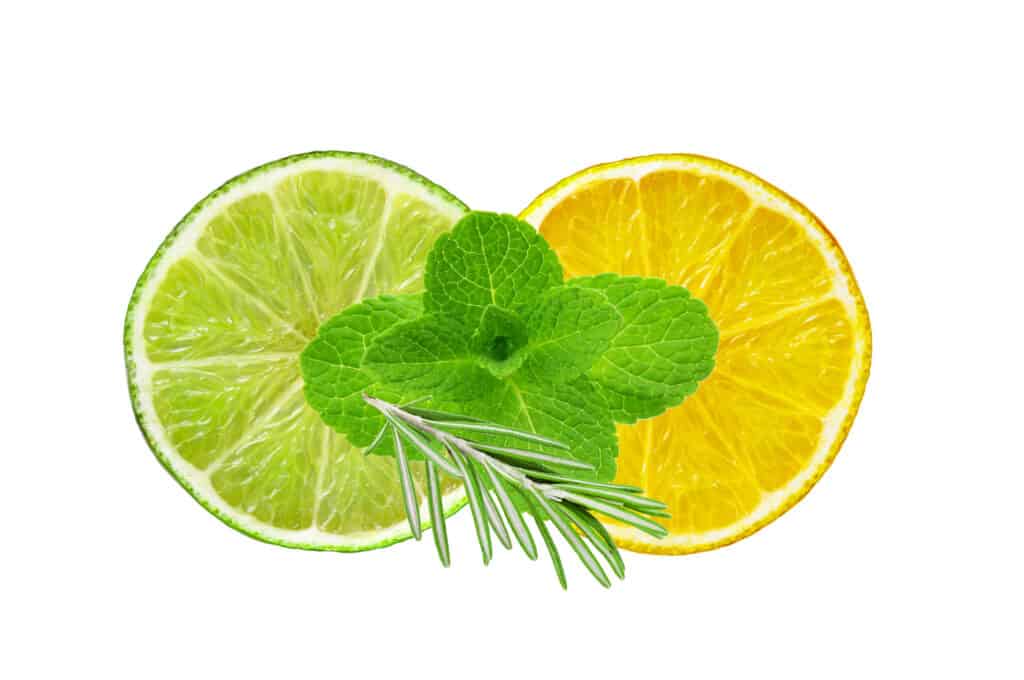Remember the pre-COVID world when a budtender would allow you to smell inside the jar of weed you were inquiring about? Perhaps it was the content of THC or CBD that had caught your eye, maybe the price, or even the name of the strain. For me, the ultimate seduction has always been what the buds smell like; if my olfactory senses are drowning in a pungent sea of citrus then I’m much more inclined to spend above my usual flower budget.
The zesty aroma of limonene, one of the most bountiful terpenoids in cannabis, is fragrant and immediately identifiable. Found also in citrus peels (orange rind oils contain 97%), as well as rosemary, peppermint, and juniper, limonene is a biological compound produced by plants to ward off predators. The lemon-lime scent of this monoterpene is a familiar component of many popular cannabis strains, most notably Banana OG, Berry White, Cinex, Do-Si-Dos, GSC, Jack Herer, OG Kush, Purple Hindu Kush, Quantum Kush, Super Lemon Haze, and White Fire OG.
Limonene is also commonly used in a variety of household items such as lotions, soaps, laundry detergents, air fresheners, and insect repellents. Heretofore, limonene oils have been used for their calming and therapeutic properties in aromatherapy. But fragrance appeal is only part of the allure of this prolific botanical aggregate—limonene is also believed to be anti-inflammatory, antioxidant, and anti-stress. And it may possibly prevent diseases.
A 2017 research study using rats with ulcerative colitis as models found limonene decreased disease activity and heightened antioxidants that inhibit inflammation. Additionally, there have been multiple test-tube studies that show limonine may be useful for treating bronchial asthma and allergies, reducing leukemia cell activity, and stunting the progression of osteoarthritis, the latter of which there is currently no cure for. In animal studies, limonene has been shown to combat tumor growth and demonstrate a rise in levels of liver enzymes, a major constituent for detoxification of carcinogens.
In 2000, Arizona scientists conducted the first study of its kind examining the relationship between human consumption of citrus peels (often used to flavor teas and cuisine) and squamous cell carcinoma (SCC), a form of skin cancer. Research found that human subjects with higher amounts of citrus peel intake decreased risk of developing skin SCC . Limonene is already being utilized by the medical industry to help pharmaceutic ointments and creams penetrate the skin.
Due to exhibiting an increase in liver enzymes, limonene is thought to be broken down by the liver. It is therefore predicted to have possible interactions with medications that can either enhance or diminish doses of limonene. Prednisone, a commonly prescribed corticosteroid, is believed to lessen the effects of limonene, while Prilosec (used to treat acid reflux and ulcers) is theorized to elevate effects. Limonene may also contribute to the increase and decrease of how other medications are broken down by the liver.
Much of the existing research has been collected using test tubes or from studies with animal subjects, which is why the terpene’s effects on the human body remain speculative. However, that’s not standing in the way of the health and wellness industry, where limonene is already being marketed as a natural way to enhance energy and focus.
Concentrated supplements in both capsule and liquid form are the prevalent options, but Emerald Health Therapeutics also offers “fast action” oral sprays featuring limonene. SYNC 15 Nano, available in both CBD and THC formulas, “uses nanoemulsion technology to achieve faster and more predictable effects than edibles and oils.” The British Columbia-based company dilutes CBD oil with water as the base of its product, allowing for absorption via bloodstream as opposed to the digestive system. While this product is currently available in Canada only, there are a number of brands with limonene products for the US market.
At the top of that list are True Terpenes, who offer botanically-sourced terpene isolate for product development and formulations, concentrates, edibles, topicals, etc. In addition to their limonene isolate, the Portland-based brand also features the Terpology line, recently cultivated by terpene guru Dr. Ethan Russo. Both the Energy and Calm blends showcase limonene as primary ingredients.
Another Oregon-based brand, Periodic edibles [Pe] makes gluten-free vegan caramels that include dominant terpene profiles sourced from cannabis, as well as information about the strain used to make the product. Periodic founder Wayne Schwind graduated with a chemical engineering degree, and the company’s branding draws inspiration from the science of cannabis–their packaging is clinical in appearance and lists the terpenes used for each variety of caramel. Both their 50mg Active and Balance caramels feature limonene.
As the industry widens its embrace of terpenoids as valuable components of cannabis, we can only hope that science will do the same, continuing to explore the possibilities of terpenes and cannabinoids as viable sources of medicine. Though we know relatively little about the gamut of terpenoids found in cannabis, there are already several that have caught the attention of scientists, and consequently the industry market. Limonene has risen to the top of that list, and this seems like a good place for the research to begin.




